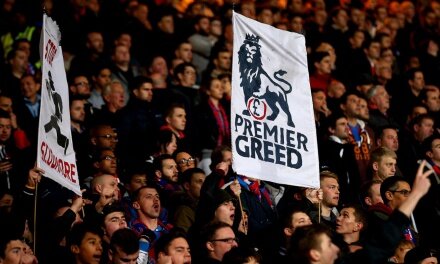
Jeremy Corbyn’s plan to renationalise the railways is not just an “ideological joyride”
Conservatives have dismissed Jeremy Corbyn’s rail renationalisation plans as an “ideological joyride.” Alex Miller argues that while this plan might be ideologically driven, it has potential.
“Ideological joyride”: that’s the phrase used by the Secretary of State for International Development, Justine Greening, on the Andrew Marr Show this week, and it pretty much perfectly sums up the point of view of the Tory party on the matter of renationalising the railways. Whether that’s because the whips have strictly enforced this view as party line or because the whole party strongly believes in a privately owned rail network is questionable (I would initially suggest it’s a mix of the two). However, what is clear is that the debate over whether Corbyn’s flagship policy is actually possible or just ideological is just getting started.
Firstly, an ideological joyride is not Corbyn’s more fun sounding version of Miliband’s infamous ‘Ed Stone’ from this year’s general election. It’s the suggestion from the Tories that Jeremy Corbyn is implementing policy that’s not necessarily best for the country, or in keeping with the times, and is only being pushed because he’s dreamed of it for years on the backbenches.
The Conservatives certainly think this is the case and that policies such as renationalising the railways aren’t pragmatic or feasible, and are merely socialist daydreams. The current Transport Secretary, Patrick McLoughlin, has declared the plans, “backwards looking”, whilst George Osborne has calculated the cost of taking the rail network out of the private sector at £10 billion. The Chancellor has previously labelled Corbyn’s plan as a “recipe for disaster,” but of course this is the generic criticism we come to expect in the very partisan political climate that we have found ourselves in.
Are the Tories to be believed then? Corbyn formally unveiled his plan at the Labour party annual conference in Brighton earlier this week and proudly named his proposal “a people’s railway.” A very socialist, ideological title, but names aside, Corbyn has placed Lillian Greenwood, Shadow Transport Secretary, at the head of a railways taskforce, tasked with looking into how to bring his plan to life by 2020.
What makes this plan most feasible is the fact that there would be no need for messy buyouts and painful wrestling matches between large transport corporations and the Labour party. Nationalisation would occur line-by-line, and when the contract for a line ends, routes would be swiftly brought under public ownership. In the UK there are currently 16 rail franchises, five of which will be out of contract and available for public take over between 2020 and 2025. All of this makes the Conservative doom and gloom almost easily forgotten. What’s more, Corbyn has promised fairer fares and better services once his “people’s railway” is established. This is also something which could potentially be achieved with government owned bodies being open to greater scrutiny, expert advice and being, theoretically, more about people than profit.
In 2009 the East Coast Mainline was brought under public ownership by the Department of Transport and operated successfully up until February of this year when the franchise was bought by Virgin Trains. This line is modern day proof that nationalised rail services can work and aren’t a total train wreck (if you’ll pardon the pun) like the Conservatives might suggest.
What’s more, according to The Independent, in 2013 two thirds of the public backed the idea of a nationalised rail network and in the same year YouGov calculated that 52% of Tory voters supported the idea too. Better services and cheaper tickets, which publicly owned rail often promises, is clearly a very popular idea and why wouldn’t it be? Let’s face it, we all feel like the train system in this country could be more efficient and less expensive.
UK and Ireland railway map | PeterEastern
So what’s the catch then? Quite simply, Osborne isn’t far off the mark when he predicts this proposal will cost around £10 billion. The reason why the rail network in this country was privatised in 1994 by the Conservatives in the first place was due to the financial burden it put upon the government. Finding the money for such a bold scheme in such a tough economic climate is a big ask, and that’s the biggest reason why the feasibility of Corbyn’s plan is being called into question. Corbyn’s answer however, is brand new tax structures set out by Shadow Chancellor John McDonnell. Robin Hood and mansion taxes are on the cards, and even an 80% tax on the super-rich proposed by economic advisor Thomas Picketty.
Overall, the idea of a cheaper and all round better rail network in Britain is definitely something myself and the British people can rally around. Waiting on cold platforms for hours on end due to delays when I’ve paid £70 for a quick weekend trip home is the kind of thing that we can all do without, and if the takeovers can be done in a smooth manner like Corbyn suggests is possible, I’m totally for it.
Providing everything that’s been promised can be achieved, and we of course can’t simply presume that it will be, the main sticking point is obviously how to fund the project. With Network Rail, the authority responsible for the UK train network, currently in £32 billion worth of debt and Corbyn’s other policies such a free university tuition and an expansion of welfare programs set to break the bank also, the real stumbling block for this proposal is how on earth will his government find the money. In reality, Corbyn’s plan could be considered feasible with the single proviso that he finds the money by the proper means i.e. not borrowing billions or printing extra money.
His decision to include the renationalisation of the railways into his set of policy pledges is most probably driven by his ideology. He is striking a victory for socialists across the nation and achieving something he’s surely dreamed of doing for a very long time. However, Jeremy Corbyn is not a total fool, as the right-wing press likes to make out, he knows this policy has public support and he will know that this policy is, at least potentially, feasible. If it wasn’t he would have had no choice but to dispel it from his list of pledges.
All in all, Corbyn’s plan is ideologically driven, but this isn’t a joyride, it’s a policy that can be achieved, so long as his team can find the money to put his dream in place, and that is definitely going to be a very tall order.






























Discussions